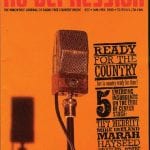Larry Cordle & Lonesome Standard Time – Singing bloody murder
So is country music really dead? “Well,” says Larry Cordle, the leader of the country-bluegrass band Lonesome Standard Time, “do you listen to the radio at all? Country music, at least as I know it, pretty much is. It’s a shame to me that if you turn on a country station in a major market, you won’t hear a country song,” he says. “It’s pop music to me. Why don’t you just call it what it is?”
But if you turn on a so-called Americana station, you might just hear the title tune from Cordle & LST’s new album Murder On Music Row, the inaugural release on Nashville label Shell Point Records. The song, written by Cordle and label namesake Larry Shell, is a searing indictment of the state of country radio and a lament for the death of country music in Nashville: “The almighty dollar and the lust for worldwide fame/Slowly killed tradition and for that someone should hang/Oh they all say not guilty but the evidence will show/That murder’s been committed down on Music Row.”
Not that Nashville’s been bad to Cordle. He’s essentially a bluegrass musician who has made a decent living selling songs to country stars such as Trisha Yearwood, George Jones, Reba McEntire, Alison Krauss, Diamond Rio, Loretta Lynn and John Anderson. Three of his songs have gone to #1 on the country charts, including old friend Ricky Skaggs’ “Highway 40 Blues”. He’s appeared on the Grand Ole Opry and at the Ryman Auditorium, and recorded three albums for the Sugar Hill label.
He’s even had two tunes covered by the colossus of ’90s pop-country, Garth Brooks: “Alabama Clay” from Brooks’ first album and “Against The Grain” from his third. He calls Brooks “one of those people that just came through my life, thank God.”
Cordle doesn’t begrudge Brooks or any of the other platinum-selling stars of pop-country their success. He reserves his rancor for the Music Row execs who’ve turned their backs on the grand tradition of country music. “I have a lot of mixed feelings about Nashville trying to eradicate a form of music,” he says.
The country establishment’s turn away from tradition has actually been a boon to bluegrass, says Cordle, as those hungry for roots music turn to one of the few remaining alternatives. “Bluegrass has had a big resurgence here because of the non-country music” masquerading as country, he says, adding that the rock musicians he knows in Nashville also have expressed a fondness for bluegrass. “The only people I’ve met who aren’t fans of bluegrass,” he claims, “are the commercial music people on Music Row.”
Cordle names Alan Jackson, George Strait, Lee Ann Womack, Brad Paisley and, on occasion, Mark Chesnutt as among the handful of popular country artists still making real country records. Strait and Jackson, in fact, reportedly have recorded a duet version of “Murder On Music Row” that’s due out in early 2000, and, ironically, might just get this attack on country radio some airplay on the very stations it assails.
But Cordle’s not optimistic that things are going to change. “I don’t think we’ll ever go back to George Jones, Haggard, Lefty,” he laments. “It’s pretty much over as big-time music.”
Still, he admits not everything he hears is awful. “I don’t particularly like the new stuff,” he says, “but occasionally I find a gem — when I can stand to turn the radio on.”




